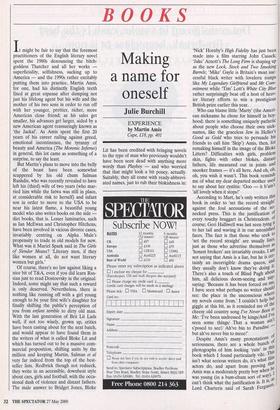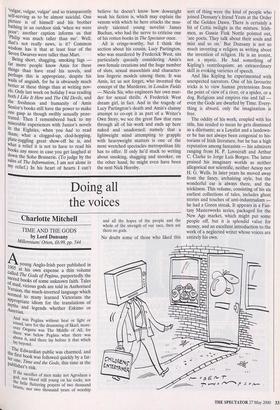BOOKS
Making a name for oneself
Julie Burchill
EXPERIENCE by Martin Amis Cape, £18, pp. 401 It might be fair to say that the foremost practitioners of the English literary novel .spent the 1980s denouncing the bitch- goddess Thatcher and all her works superficiality, selfishness, sucking up to America — and the 1990s rather excitably putting them into practice. Martin Amis, for one, had his distinctly English teeth fixed at great expense after dumping not just his lifelong agent but his wife and the mother of his two sons in order to run off with her younger, prettier, richer, more American close friend; as his sales get smaller, his advances get larger, aided by a new American agent reassuringly known as `the Jackal'. As Amis spent the first 20 years of his career railing against greed, emotional incontinence, the tyranny of beauty and America (The Moronic Inferno) in general, this lot came as something of a surprise, to say the least.
But Martin's plans to move into the belly of the beast have been somewhat scuppered by his old chum Salman Rushdie, who was recently revealed to have left his (third) wife of two years (who mar- ried him while the fatwa was still in place, at considerable risk to herself) and infant son in order to move to the USA to be near his latest flame, a beautiful young model who also writes books on the side diet books, that is. Lesser luminaries, such as Ian McEwan and Christopher Hitchens, have been involved in vicious divorce cases, invariably centring on Alpha Male's propensity to trade in old models for new. What was it Muriel Spark said in The Girls of Slender Means? 'Literary men, if they like women at all, do not want literary women but girls.'
Of course, there's no law against liking a nice bit of T&A, even if you did learn Rus- sian just to read Dostoevsky in the original. Indeed, some might say that such a reward is only deserved. Nevertheless, there is nothing like running off with a girl young enough to be your first wife's daughter for finally shifting the public's perception of you from enfant terrible to dirty old man. With the last generation of Brit Lit Lads well, if not too wisely, grown up, critics have been casting about for the next batch, and would appear to have found them in the writers of what is called Bloke Lit and which has turned out to be a massive com- mercial proposition, shifting units by the million and keeping Martin, Salman et al very far indeed from the top of the best- seller lists. Redbrick though not redneck, they write in an accessible, downbeat style about cars, girls and football, with the occa- sional dash of violence and distant fathers. The male answer to Bridget Jones, Bloke Lit has been credited with bringing novels to the type of man who previously wouldn't have been seen dead with anything more wordy than Playboy — and who worried that that might look a bit poncy, actually. Suitably, they all come with ready-abbrevi- ated names, just to rub their blokishness in: `Nick' Hornby's High Fidelity has just been made into a film starring John Cusack; `Jake' Arnott's The Long Firm is shaping up as the new Lock, Stock and Two Smoking Barrels; 'Mike' Gayle is Britain's most suc- cessful black writer with lovelorn romps like My Legendary Girlfriend and Mr Com- mitment while 'Tim' Lott's White City Blue rather surprisingly beat off a host of heav- ier literary efforts to win a prestigious British prize earlier this year.
Who can blame little 'Marty' (the Ameri- can nickname he chose for himself in boy- hood; there is something uniquely pathetic about people who choose their own nick- names, like the graceless Jew in Heller's Good as Gold who tries to persuade his friends to call him 'Skip') Amis, then, for remaking himself in the image of the Bloke Litters? Difficulties with girls, problem skin, fights with other blokes, distant fathers, life measured out in joints and snooker frames — it's all here. And oh, oh, oh, you wish it wasn't. This book reminds me of what my dear departed mother used to say about her cystitis: 'Goo — it b'ain't 'alf lovely when it stops!' According to Mart, he's only written this, book in order to 'set the record straight against the foul accusations of the nd", necked press. This is the justification 01 every touchy braggart in Christendom, of course; Geri Halliwell was last seen tying 11 to her tail and waving it in our astonished faces. The fact is that those who seek te `set the record straight' are usually liars' just as those who advertise themselves as `honest brokers' are invariably crooks. I am not saying that Amis is a liar, but he is cm' tainly an incorrigible drama queen, and they usually don't know they're doing It' There's also a touch of Blind Pugh about him, all delicious doom-seeing and nor saying: 'Because it has been forced on ut; I have seen what perhaps no writer should see: the place in the unconscious where my novels come from.' I couldn't help but giggle at this bit, as it reminded me of the cheesy old country song I've Never Been to Me: 'I've been undressed by kings/And IyC seen some things/ That a woman 801 s'posed to see!/ Ah've bin to Paradise but ah've never bin to meee!' Despite Amis's many protestations di seriousness, there are a whole bunch of photographs of him looking 'cute' in tills book which I found particularly vile. T??..: isn't what serious writers do, it's what flit''t actors do, and apart from proving that actors was a moderately pretty boy wile°, I was young (in a bum-chum sort of vvay),_ can't think what the justification is. It is, N2 Lord Charteris said of Sarah Fergustw' `vulgar, vulgar, vulgar' and so transparently self-serving as to be almost suicidal. One picture is of himself and his brother bathing in an outdoor sink 'when we were poor'; another caption informs us that Philip was much taller than me'. Well, that's not really news, is it? Common wisdom has it that at least four of the Seven Dwarves were taller than Mart.
Being short, shagging, smoking fags far more people know Amis for these things than have read his novels, and perhaps this is appropriate, despite his Wails of anguish, for he is obviously much better at these things than at writing nov- els. Only last week on holiday I was reading both I Like It Here and The Old Devils, and the freshness and humanity of Amis Senior's books still have the power to make one gasp as though swiftly sexually pene- trated. Then I remembered back to my miserable experiences with Junior's novels in the Eighties, when you had to read them; what a clogged-up, clod-hopping, plate-juggling great show-off he is, and what a relief it is not to have to read his books any more in case you get laughed at down the Soho Brasserie. (To judge by the sales of The Information, I am not alone in my relief.) In his heart of hearts I can't believe he doesn't know how downright weak his fiction is, which may explain the venom with which he here attacks the mas- sively talented young novelist James Buchan, who had the nerve to criticise one of his rotten books in The Spectator once.
All is cringe-worthy, but I think the section about his cousin, Lucy Partington, who was murdered by Frederick West, sits particularly queasily considering Amis's own female creations and the huge number of sluts, sexual masochists and character- less lingerie models among them. It was Amis, let us not forget, who invented the concept of the Murderee, in London Fields — Nicola Six, who engineers her own mur- der for sexual thrills. A Frederick West dream girl, in fact. And in the tragedy of Lucy Partington's death and Amis's clumsy attempt to co-opt it as part of a Writer's Own Story, we see the great flaw that runs through all of his work and ends up here naked and unadorned; namely that a lightweight mind attempting to grapple with heavyweight matters is one of the most wretched spectacles metropolitan life has to offer. If only he'd stuck to writing about smoking, shagging and snooker, on the other hand, he might even have been the next Nick Hornby.



































































 Previous page
Previous page